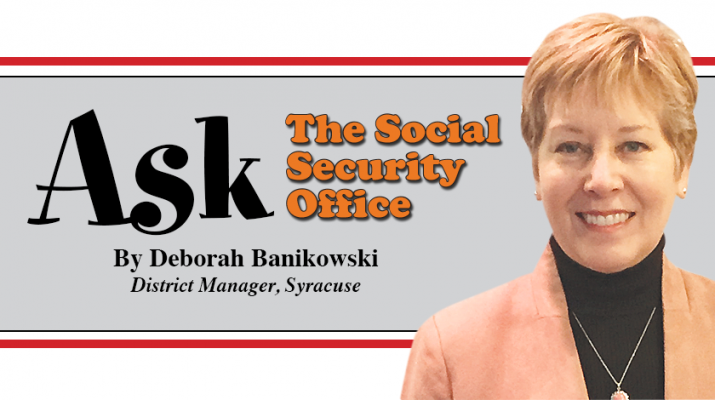By Deborah Banikowski
District Manager, Syracuse
If you have higher income, the law requires an upward adjustment to your monthly Medicare Part B (medical insurance) and Medicare prescription drug coverage premiums. But if your income has gone down, you may use form SSA-44 to request a reduction in your Medicare income-related monthly adjustment amount.
Medicare Part B helps pay for your doctors’ services and outpatient care. It also covers other medical services, such as physical and occupational therapy, and some home health care. For most beneficiaries, the government pays a substantial portion — about 75 percent — of the Part B premium, and the beneficiary pays the remaining 25 percent.
If you’re a higher-income beneficiary, you’ll pay a larger percentage of the total cost of Medicare Part B, based on the income you report to the Internal Revenue Service (IRS). You’ll pay monthly Part B premiums equal to 35, 50, 65, 80, or 85 percent of the total cost, depending on the income you report to the IRS.
Medicare Part D prescription drug coverage helps pay for your prescription drugs. For most beneficiaries, the government pays a major portion of the total costs for this coverage, and the beneficiary pays the rest. Prescription drug plan costs vary depending on the plan, and whether you get Extra Help with your portion of the Medicare prescription drug coverage costs.
If you’re a higher-income beneficiary with Medicare prescription drug coverage, you’ll pay monthly premiums plus an additional amount, which is also based on the income you report to the IRS. Because individual plan premiums vary, the law specifies that the amount is determined using a base premium. Social Security ties the additional amount you pay to the base beneficiary premium, not your own premium amount. If you’re a higher-income beneficiary, we deduct this amount from your monthly Social Security payments regardless of how you usually pay your monthly prescription plan premiums. If the amount is greater than your monthly payment from Social Security, or you don’t get monthly payments, you’ll get a separate bill from another federal agency, such as the Centers for Medicare & Medicaid Services or the Railroad Retirement Board.
You can find Form SSA-44 online at www.socialsecurity.gov/forms/ssa-44.pdf. You can also read more in the publication “Medicare Premiums: Rules For Higher-Income Beneficiaries” at: www.socialsecurity.gov/pubs/EN-05-10536.pdf.
Q&A
Q: I’m gathering everything I’ll need to file my taxes this month. Do I have to pay taxes on Social Security benefits? Also, where can I get a replacement 1099?
A: Some people who get Social Security must pay federal income taxes on their benefits. Still, no one pays taxes on more than 85 percent of their Social Security benefits.
You must pay taxes on some portion of your benefits if you file an individual federal tax return and your income exceeds $25,000. If you file a joint return, you must pay taxes if you and your spouse have combined income of more than $32,000. If you are married and file a separate return, you probably will have to pay taxes on your benefits. You can read more about tax preparation in relation to Social Security at www.socialsecurity.gov/planners/taxes.htm. Social Security benefits include monthly retirement, survivors, and disability benefits. They don’t include Supplemental Security Income (SSI) payments, which are not taxable. You can also get a replacement 1099 or 1042S when you open your own personal my Social Security account at www.socialsecurity.gov/myaccount.
Q: I got an email that says it’s from Social Security, but I’m not so sure. They want me to reply with my Social Security number, date of birth, and mother’s maiden name for “verification.” Did it really come from Social Security?
A: No. Social Security will not send you an email asking you to share your personal information, such as your Social Security number, date of birth, or other private information. Beware of such scams — they’re after your information so they can use it for their own benefit. When in doubt, or if you have any questions about correspondence you receive from Social Security, contact your local Social Security office or call us at 1-800-772-1213 (TTY 1-800-325-0778) to see whether we really need any information from you.
Q: I know that Social Security’s full retirement age is gradually rising to 67. But does this mean the “early” retirement age will also go up by two years, from age 62 to 64?
A: No. While it is true that under current law the full retirement age is gradually rising from 65 to 67, the “early” retirement age remains at 62. Keep in mind, however, that taking early retirement reduces your benefit amount. For more information about Social Security benefits, visit www.socialsecurity.gov/planners/retire.

